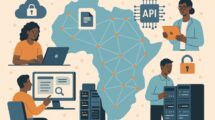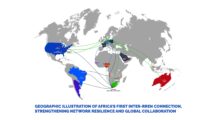Interview by Silvia Fiore, GÉANT
Fatma, how did it all start for you? How did you first become interested in the world of STEM?
In my last two years of high school, I was interested in exploring scientific and technological innovations so I choose Computer Science and Engineering, a door to many different fields and applications. After getting my Bachelor’s degree at St. Joseph University in Tanzania, I became part of the engineer registration board (ERB) in Tanzania where they recommended me to join TERNET, an organisation working to provide different solutions to research and education institutions and therefore an opportunity for me to learn more about sciences and technologies. What made me most interested in the world of STEM and wanting to pursue a career in the field was the idea of being part of a community of next generation innovators developing new products and processes for a more sustainable economy.
You worked for a few months at TERNET on a volunteering position before transitioning to a full-time contract. What did you like most about the NREN and the job? What kept you motivated to work for the benefit of research and education communities in Tanzania and the wider region?
During my internship period to becoming a full-time employer afterward, I learned more about the different technologies and solutions that we provide to help the research and education institutions across Tanzania and their challenges in ICTs. I became to love being able to help them solve their problems and address their needs.
You worked as a Network and System Administrator and have now taken up the role of Quality Assurance Officer. Can you tell us a bit more about your job? What has been your favourite assignment so far?
During the time as I worked as Network and System Administrator, I liked to help institutions to restructure and improve their network infrastructure to a better high performance – what we call at TERNET, Direct Engineering Assistance (DEA). My favourite assignment was to install systems like observium, documentation system and osticket which help the institutions monitor, document and record any incidence occurred and train them on how to manage them. When I moved to my current position as Quality Assurance Officer, I found myself really liking interacting with customers to help them resolve their ICT ‘s issues.
We all know that the network and connectivity fields are unfortunately still predominately male dominated. What can you tell us of your experience being a woman in STEM at TERNET?
As a woman, I have been extremely lucky to have mentors like Dr. Magreth Mushi, former TERNET CEO, and my two brothers Mr. Mgaya and Mr Magesa Mihayo who have been unbiased in their attitude towards me, have encouraged and advised me through challenging situations. I am also thinking of my other female colleagues 9 of whom are women, out of 24 in total.
TERNET has hosted many workshops in the past few years on the topics of system security; cloud computing, network design and operations among others. Have you noticed any improvement in terms of female representation and engagement in these events? What is TERNET doing to pursue gender equality in the work environment and during events and workshops?
Well, as the representation of African women in science and engineering is still few, therefore as TERNET we built the culture of trusting in women abilities so then during workshops or any events, we make sure we provide the equality for both men and women; this is to show that a woman is not left behind.
Before we conclude, Fatma, any last words of advice for an aspiring female network engineer.
I would encourage other women to go into STEM. It is a wonderful and a very satisfying feeling to be able to contribute towards the progress of humankind with creative and innovative solutions. You know you will be at some point touching many other lives other than your own family. This general feeling of hope and content is very satisfying. Work hard without giving up and be technically excellent, listen to clients or customers to solve their problems, share their knowledge, and commit to learning and upgrading the skillsets!





